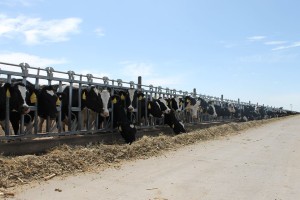Judge B. Lynn Winmill, Chief Judge of the United States District Court for the District of Idaho has denied a motion to dismiss a federal lawsuit challenging the constitutionality of the Idaho Interference with Agricultural Production statute, known as the “ag gag” statute. [Read full opinion here].
Under the statute, passed in 2014, a person commits a crime if he or she knowingly enters an agricultural production facility by force, threat, misrepresentation, or trespass; obtains records of an agricultural operation by force, threat, misrepresentation, or trespass; obtains employment with an agricultural production facility by force, threat, or misrepresentation with intent to cause economic injury; enters an agricultural production facility without the owner’s permission and makes a video or audio recording of the conduct; or intentionally causes physical damage or injury to the facility’s operations, livestock, crops, personnel, equipment, buildings, or premises. A person found guilty under the statute will be guilty of a misdemeanor punishable by a term of imprisonment of less than one year and a fine not in excess of $5,000. [Read statute here.]
Supporters of the law argue it is necessary to protect agricultural producers from media persecution, dangerous activists, and harm to their property and livelihood. Opponents argue that the law protects animal abuse and discourages people from coming forward to report improper acts.
The lawsuit, filed by a group of animal rights activists including the Animal Legal Defense Fund, PETA, Standpoint Vegetarians, and the ACLU of Idaho, claims that Idaho’s statute is unconstitutional as it violates the First Amendment, the Equal Protection Clause, and is pre-empted by federal law. The defendants, Idaho Governor, Butch Otter, and Attorney General, Lawrence Wasden, filed a motion to dismiss the suit.
The court did dismiss Governor Otto as an individual defendant and dismissed one of the plaintiff’s claims. The remaining claims, however, will be allowed to go forward. Judge Winmill reasoned that the lawsuit raises First Amendment concerns because it restricts protected speech. These restrictions will be permitted if the state’s interest in protecting private property outweigh the burden placed on free speech. This issue will be determined later in the lawsuit. With regard to the Equal Protection challenge, the judge ruled that the claim could go forward based upon plaintiffs’ allegations that the law was passed with particular animus towards animal rights activists, rather than the states purpose of protecting private property. Lastly, the court reasoned that the plaintiffs’ pre-emption claim, which argues that the law is pre-empted by federal whistleblower protections, is ripe for review.
Now, the lawsuit will proceed in the litigation process, discovery will be conducted, summary judgment motions are likely to be filed, and then, if the lawsuit continues, a trial will be held.













